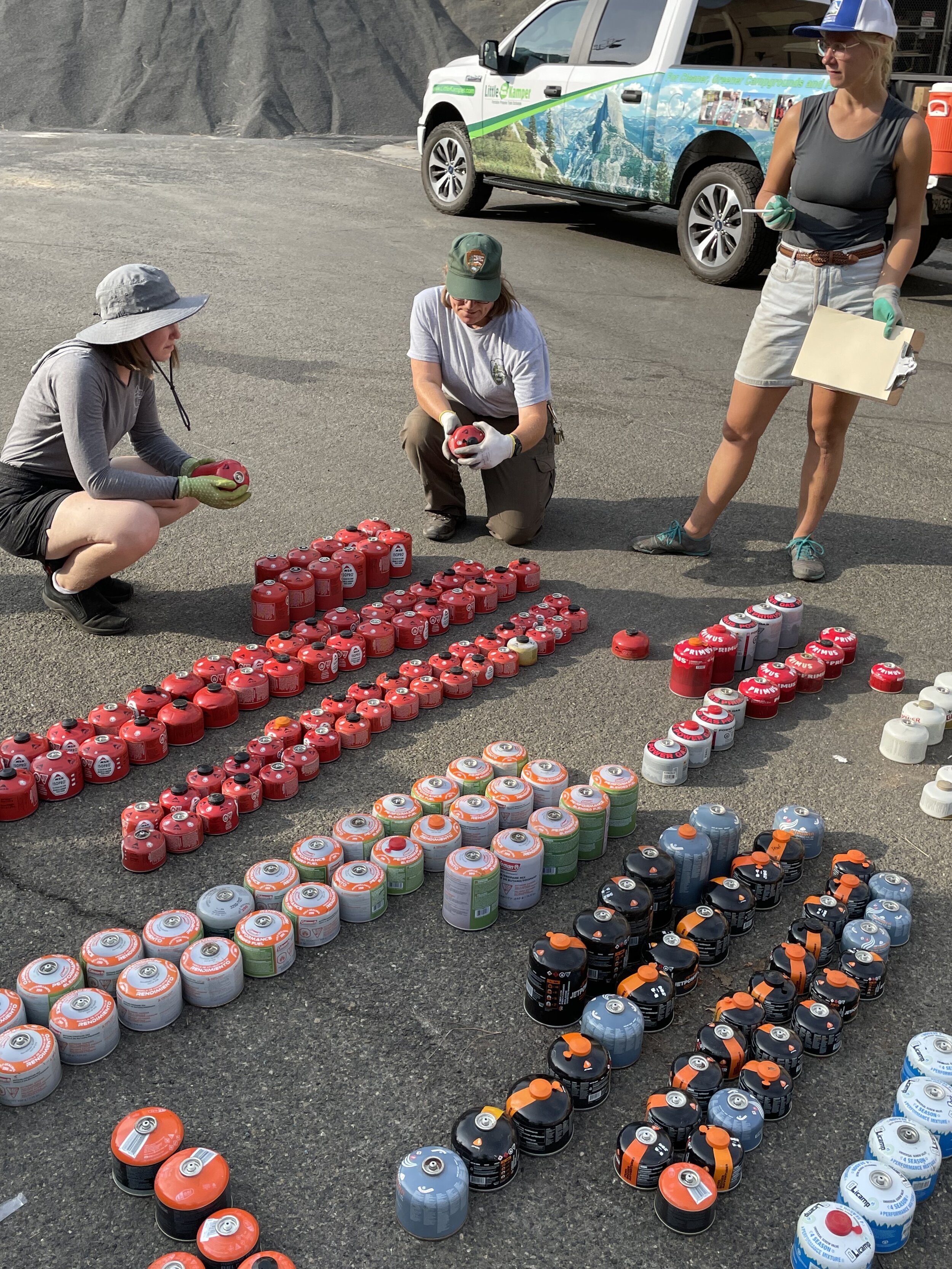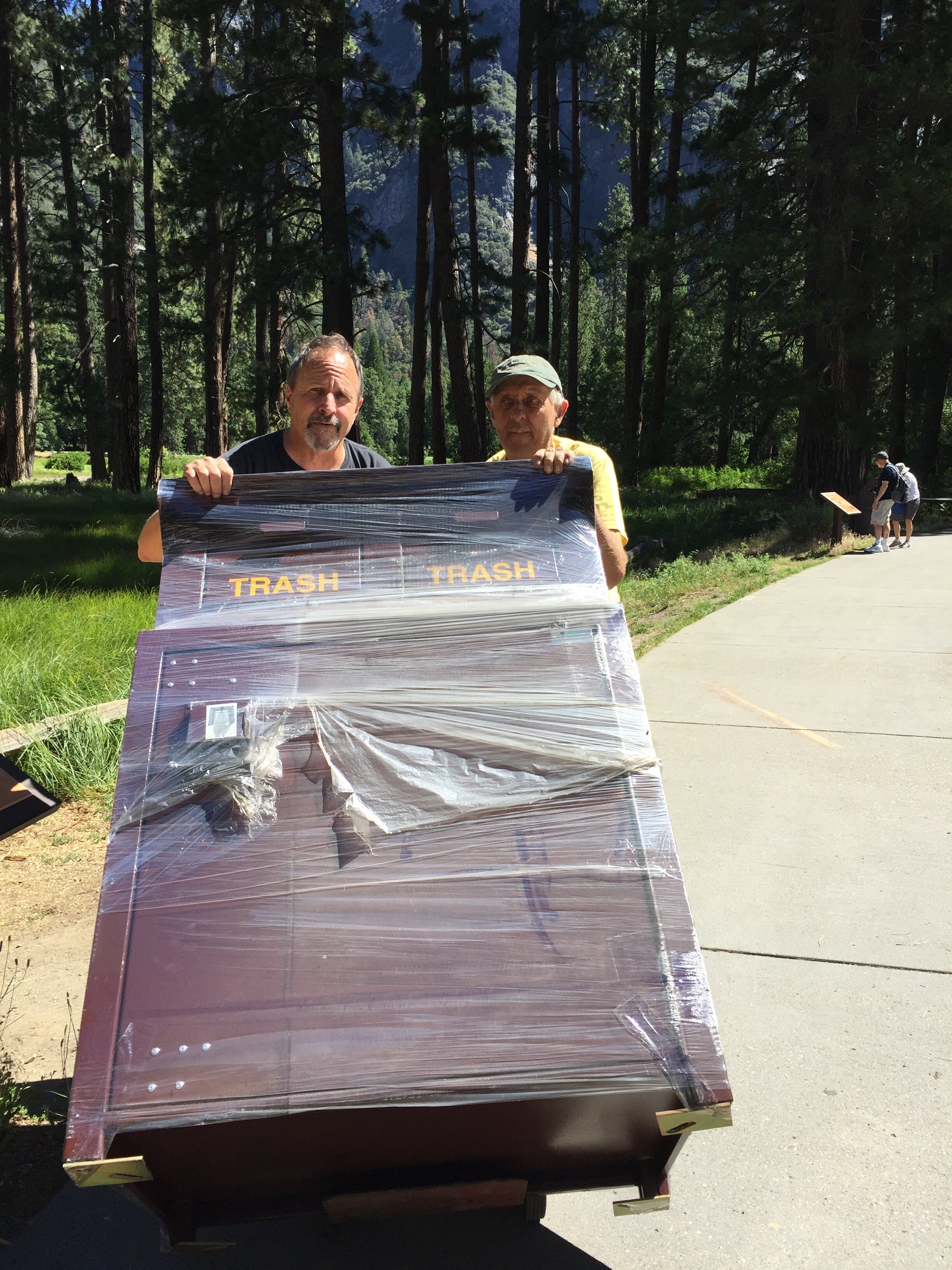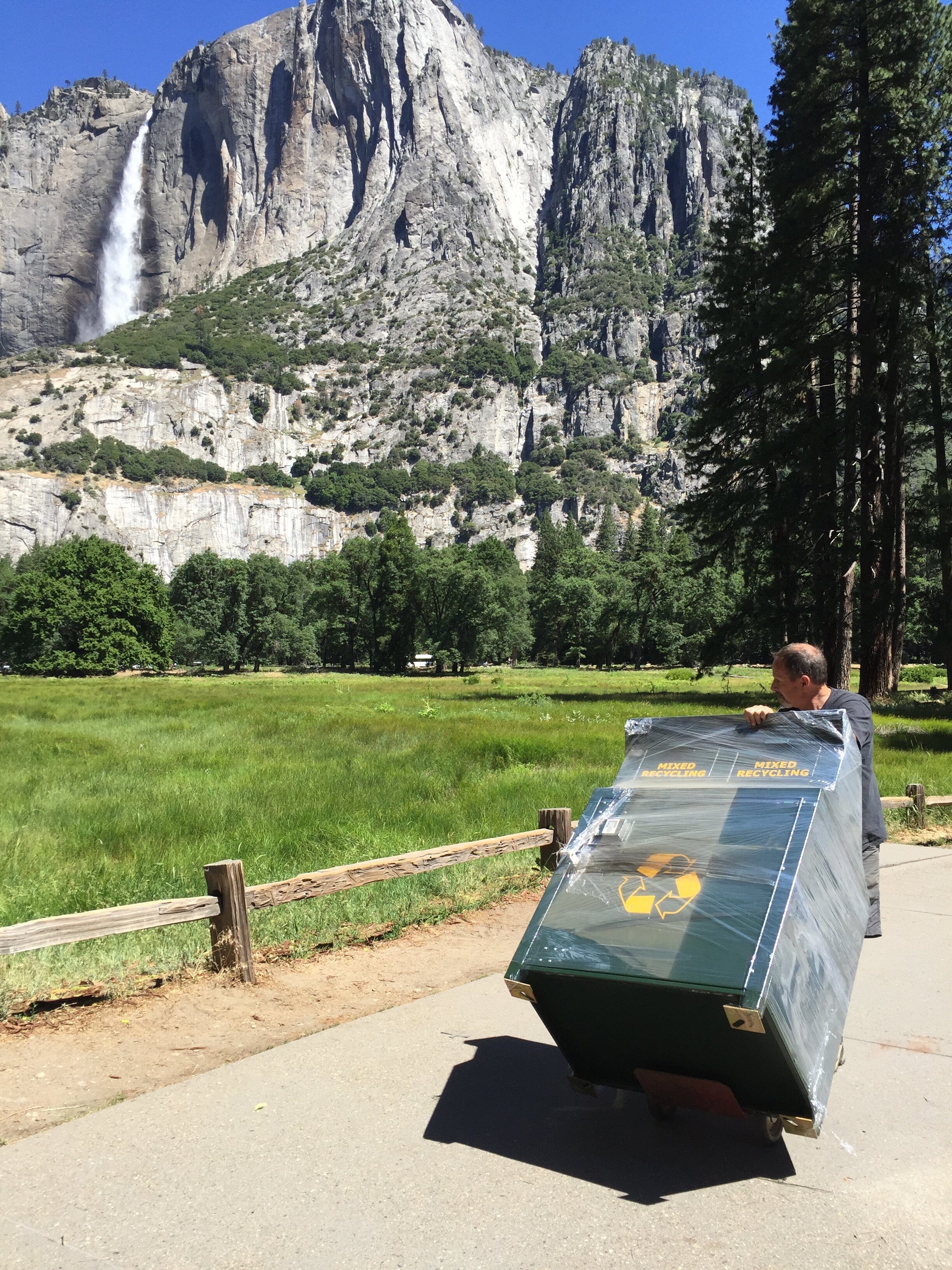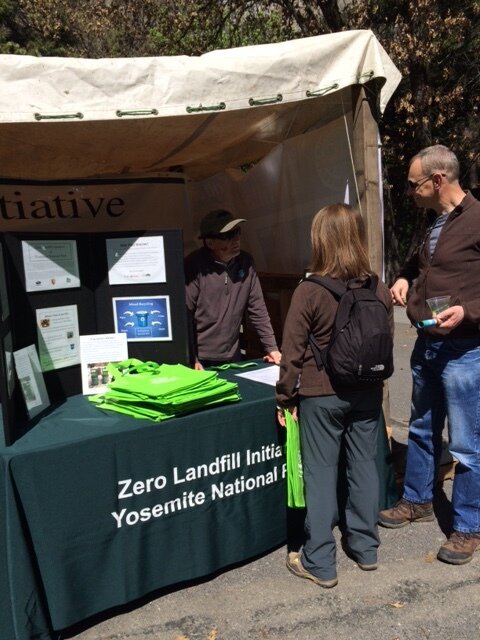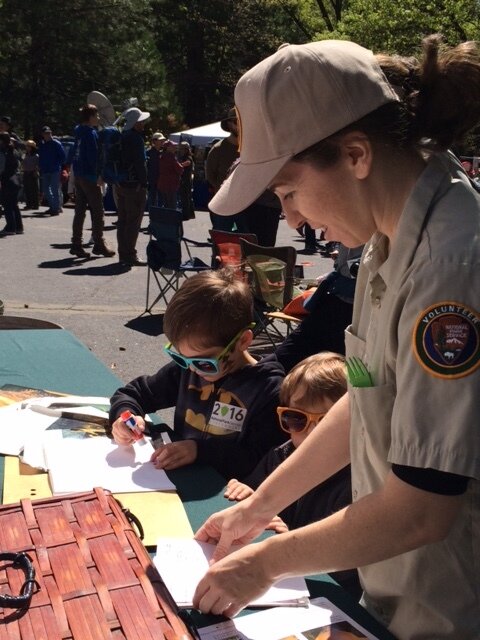YOSEMITE NATIONAL PARK
A sample of the projects the parks have implemented to reach their zero landfill goals
Links to certain characterized projects
COMPOSTING
Residential Food Waste Diversion: Everybody Loves Composting!
Since food waste was one of the two biggest components filling Yosemite’s waste stream, the park’s ZLI collaborators launched a Residential Food Waste Diversion Pilot (RFWD) in August 2021. They placed easily accessible organic collection dumpsters in park housing areas and Yosemite Hospitality kitchens. They also encouraged participation with an enrollment process, social media posts and outreach events.
Each person who enrolled met with the Yosemite Conservancy’s zero landfill and sustainability coordinator, who’d give them a three-gallon stainless steel compost bin for collecting food waste. Inside the bin was a letter explaining how the program worked.
The residential food waste participants were asked to self-report how much they were collecting on a data collection form. This was necessary because all the food waste, from both residential areas and commercial kitchens, was collected in one route. Without the self-reporting data, the ZLI team wouldn’t have known how much food waste came from each source.
As the RFWD Pilot rolled out, people throughout the Yosemite community responded. The zero landfill and sustainability coordinator made herself available at outreach events and gave out her phone number to ensure all questions would get answered. She’d gently correct misinformation and answer questions like: What’s the point? What’s methane? And is all the food waste that’s collected really being composted? But the thing people asked about most of all: How they could volunteer and get involved in other programs in addition to composting?
In the first five months, 500 local participants enrolled and more than 81,400 pounds of food waste was diverted from the landfill. The tonnage has continued to grow even in the off-season. Participants who received the small stainless compost bins have gotten bigger ones as they begin to realize how much of their trash is food waste, reporting, “I only take my trash out once a month now!”
A couple schools have begun collecting food waste, too, and getting media attention for it. Yosemite Conservancy and NatureBridge, an environmental education nonprofit, worked with the schools to develop a protocol. Then the kids took it and made it their own, leading the collection at the lunch tables. The feedback: They love doing it!
To participate, people enroll using this online form. Check out the food waste diversion pledge in Question 12. After enrollment, the zero landfill and sustainability coordinator meets groups of new participants at compost bin pick-up events, or individual drop offs are arranged as needed.
A data collection form was sent out at the beginning of each month. During the first five months, enough feedback was received to compile percentages and make needed adjustments, so the program no longer asks for household data.
RECYCLING
How Data Helped Solve a Propane Canister Problem
Forty million one-pound disposable propane canisters are sold in North America every year, four million of them in California alone. In 2014, an estimated 24,000 canisters were collected in Yosemite.
Once propane canisters are used, they’re classified as hazardous waste. That makes the cylinders difficult and expensive to store, transport and recycle properly. Park visitation numbers continue to increase, subjecting the park to ever larger disposable fuel cylinder collections and increasing recycling fees.
To address the issue, the National Park Service, Yosemite Conservancy and Yosemite Hospitality worked together to try and figure out how to influence visitor behavior.
To start, Yosemite Hospitality discontinued the sale of one-pound disposable propane canisters in its retail stores. They were replaced with reusable canisters in partnership with Little Kamper, a portable propane tank exchange company.
The program works like this: Customers purchase Little Kamper’s reusable one-pound propane canister in a store. When it’s empty, they bring it back to trade in for a discount off the next one. The first one costs more than the disposable kind, but with subsequent purchases the discount kicks in. Once the store collects enough of the reusable canisters, they’re sent back to Little Kamper where they’re refilled and sold again in stores. The reusable canisters have a lifespan of up to 12 years.
By choosing to sell only reusable propane canisters, Yosemite Hospitality is taking a more earth friendly position and offering consumers an alternative. The hope is that reusable propane sales will decrease disposable propane collection numbers in campgrounds. That will reduce the recycling costs, the potential danger of handling hazardous materials and the carbon and waste stream footprint of mass-produced, single-use propane canisters.
The biggest challenge to adopting the reusable canisters was customer resistance, mainly because the first one is expensive. In order to better understand if reusable canisters were worth the cost and effort, the ZLI partners needed more data to uncover the comparative impact of disposable, single-use canisters. So they organized the Fuel Cylinder Recycling & Education Pilot. Its goal is to sort and count whenever a critical mass of used fuel cylinders is collected from campground recycling sites.
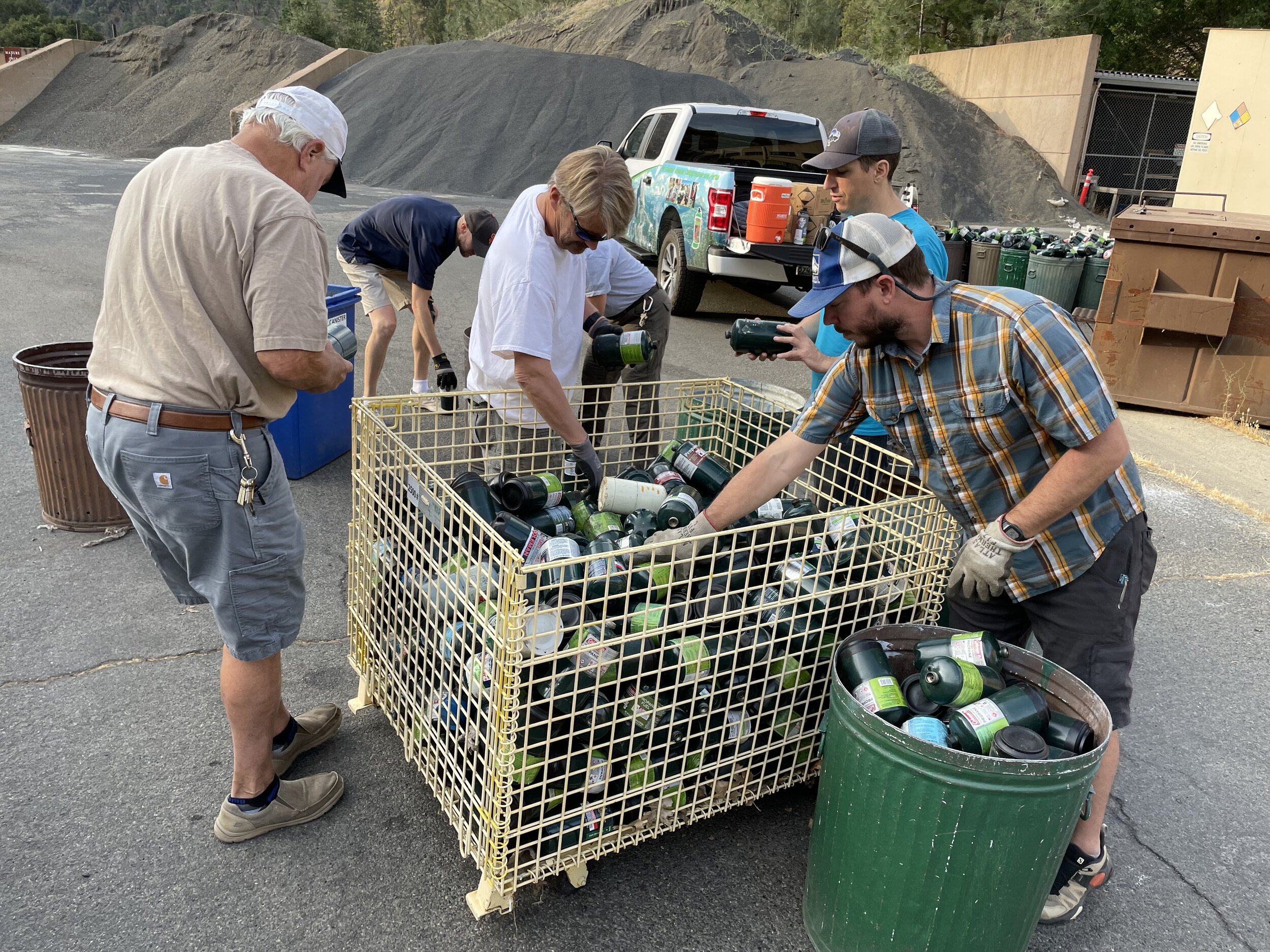
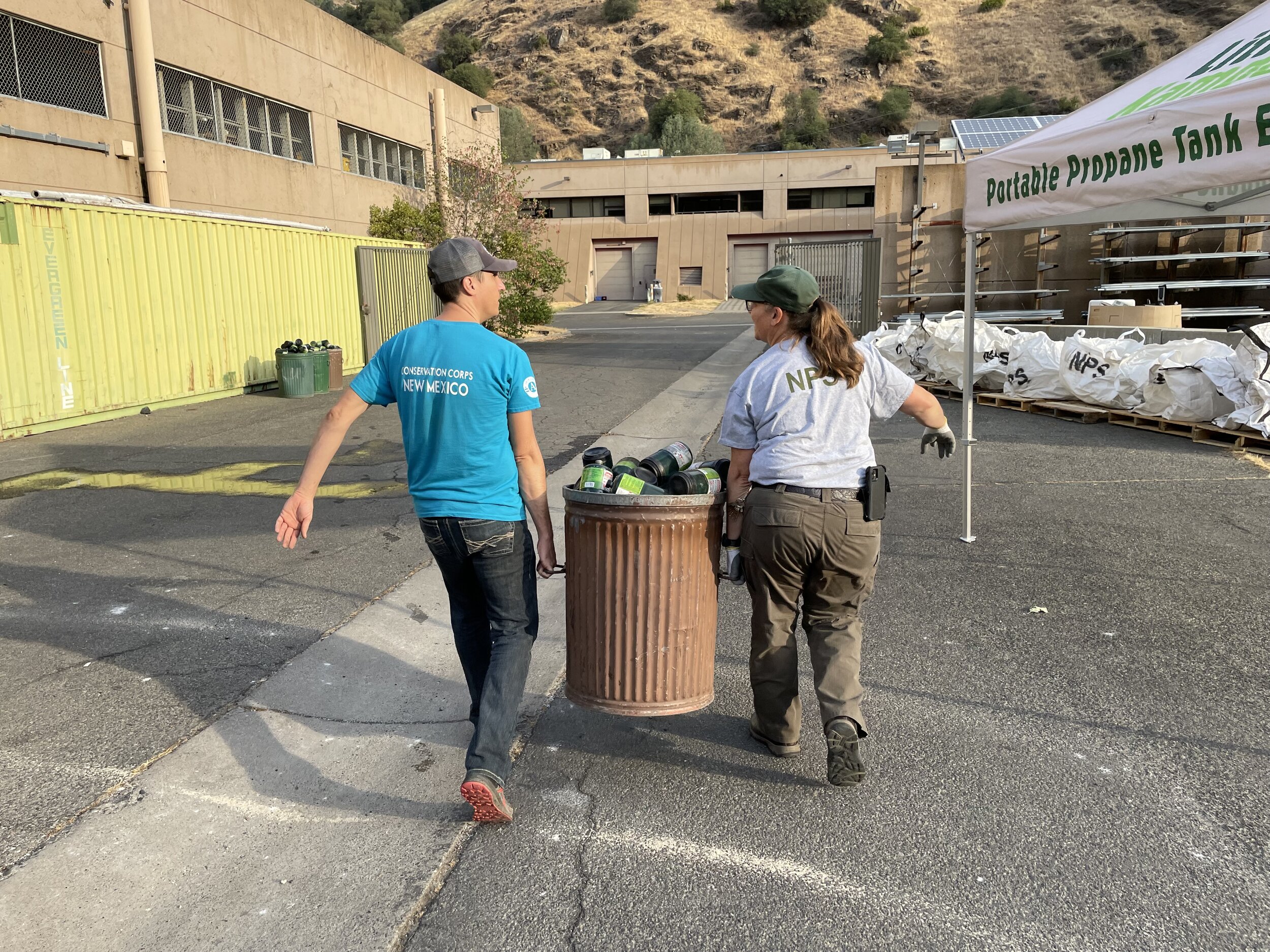
A month ahead of each count, messaging goes out on local outreach platforms to recruit volunteers from the NPS, park partners and the Yosemite community. The volunteers sort the canisters by manufacturer and count them. In 2021 the count revealed that 82 percent of the collected disposable canisters were used for propane. Sixty-three percent were manufactured by Coleman.
Armed with data, the ZLI partners can offer an accurate portrayal of the waste stream and the financial expense it creates. Little Kamper provides signs that highlight the reusable canisters’ 12-year shelf life and explain the buy-use-exchange process. Yosemite Conservancy’s zero landfill and sustainability coordinator speaks at daycares, schools and groups like Americorps.
Getting out in the community revealed where other changes were needed. At one Yosemite Hospitality store the employees didn’t know about the availability of signs or how the process worked. So the concessionaire backed up and did specific training on why they’re making the effort to recycle in a new way and why that first canister is expensive. Now employees are equipped to explain it to customers while they’re shopping or getting rung up.
Containers, Containers Everywhere…and Labeling Too!
A focus for Yosemite National Park was the replacement of old, challenging to use waste and recycling containers and the expansion of recycling containers and paired infrastructure (placing waste and recycling containers together in public and employee locations).
The hundreds of animal-resistant waste and recycling containers purchased and installed in single, double, triple and dumpster type configurations was the first step. To further support increased visibility and the quality and quantity of recycling collected, the containers were standardized for color – brown for waste and green for recycling (including placement of recycling on the left and waste containers on the right). This approach translated into greater utilization and awareness for employees and visitors.
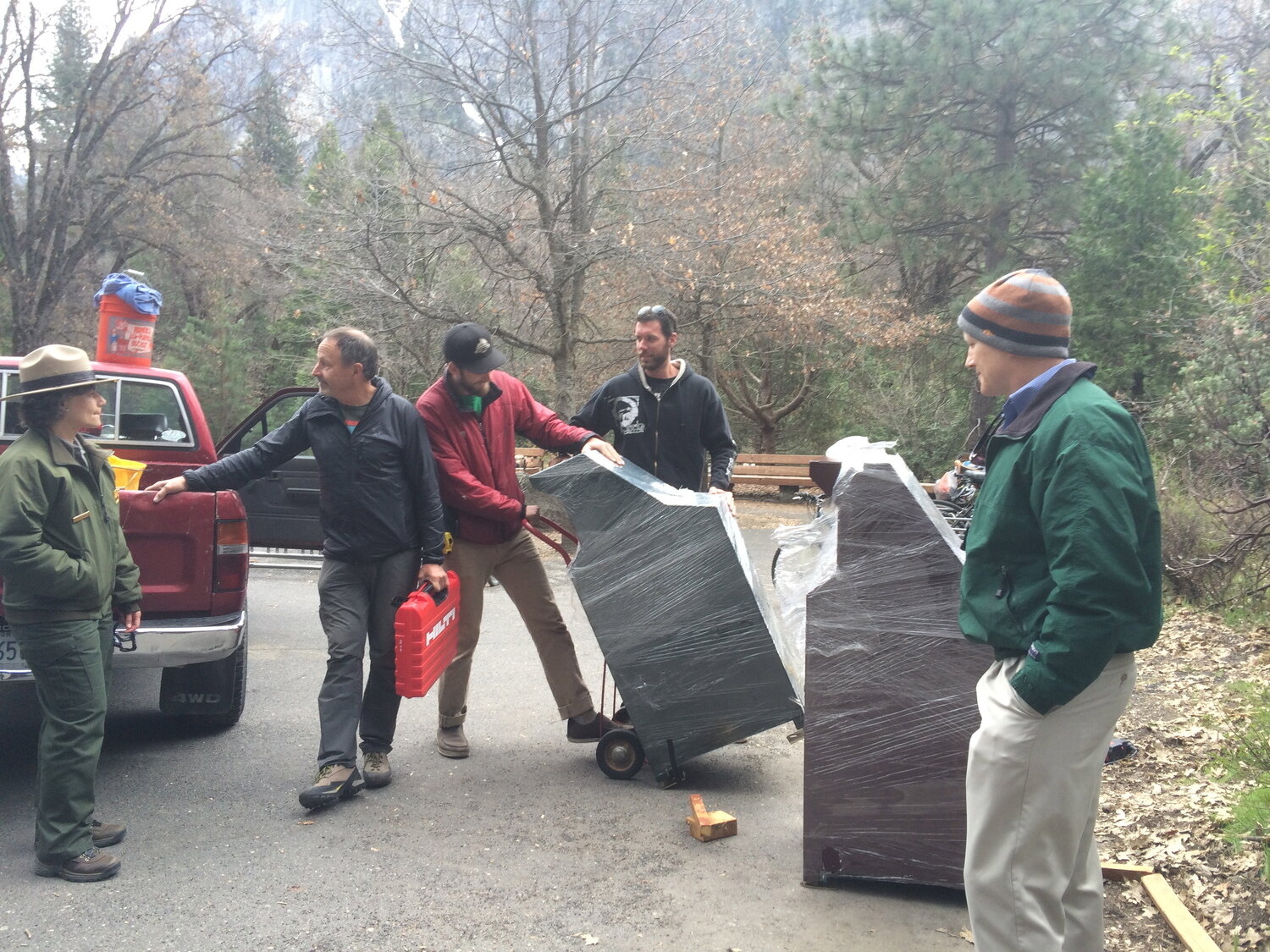
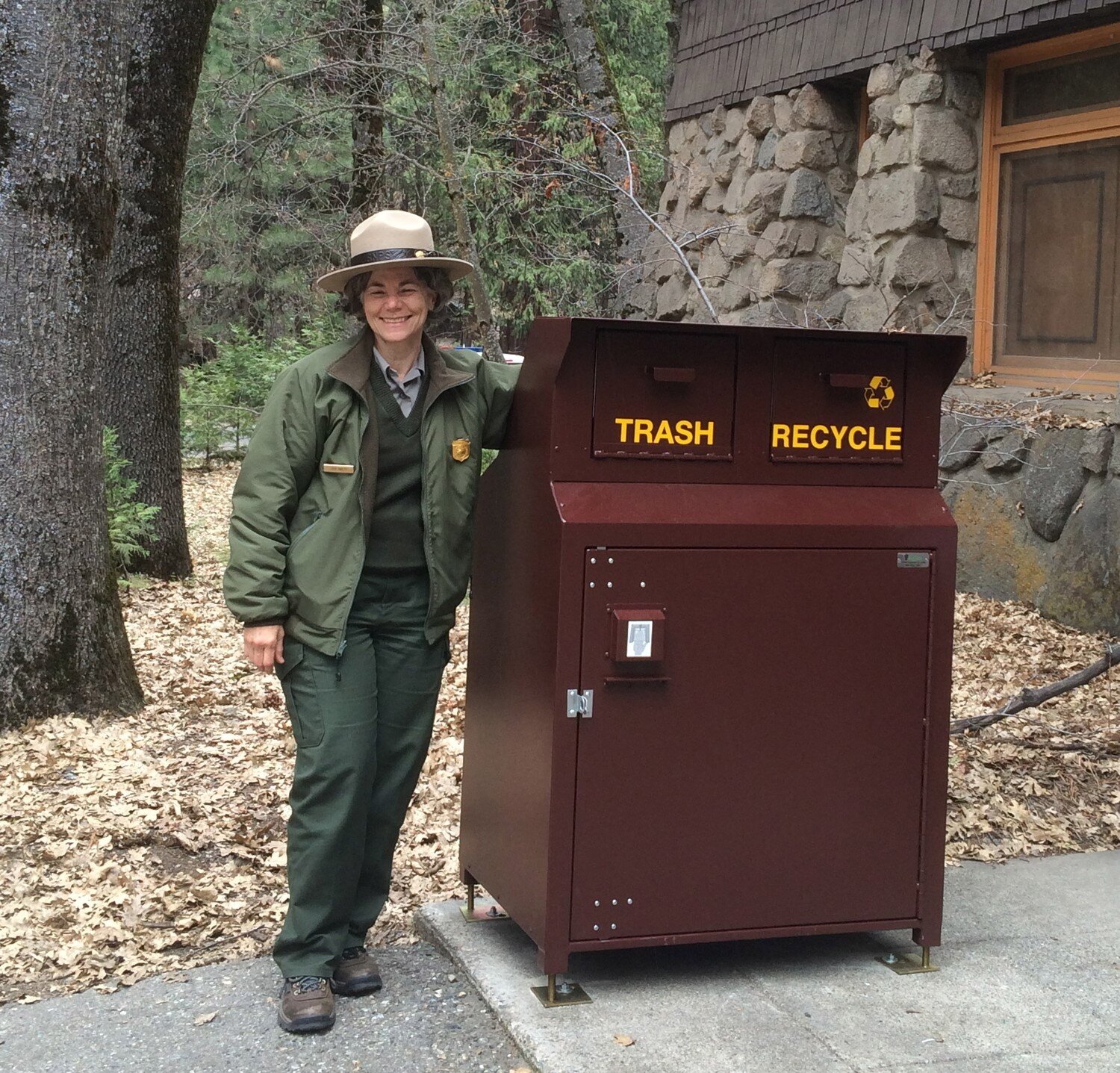
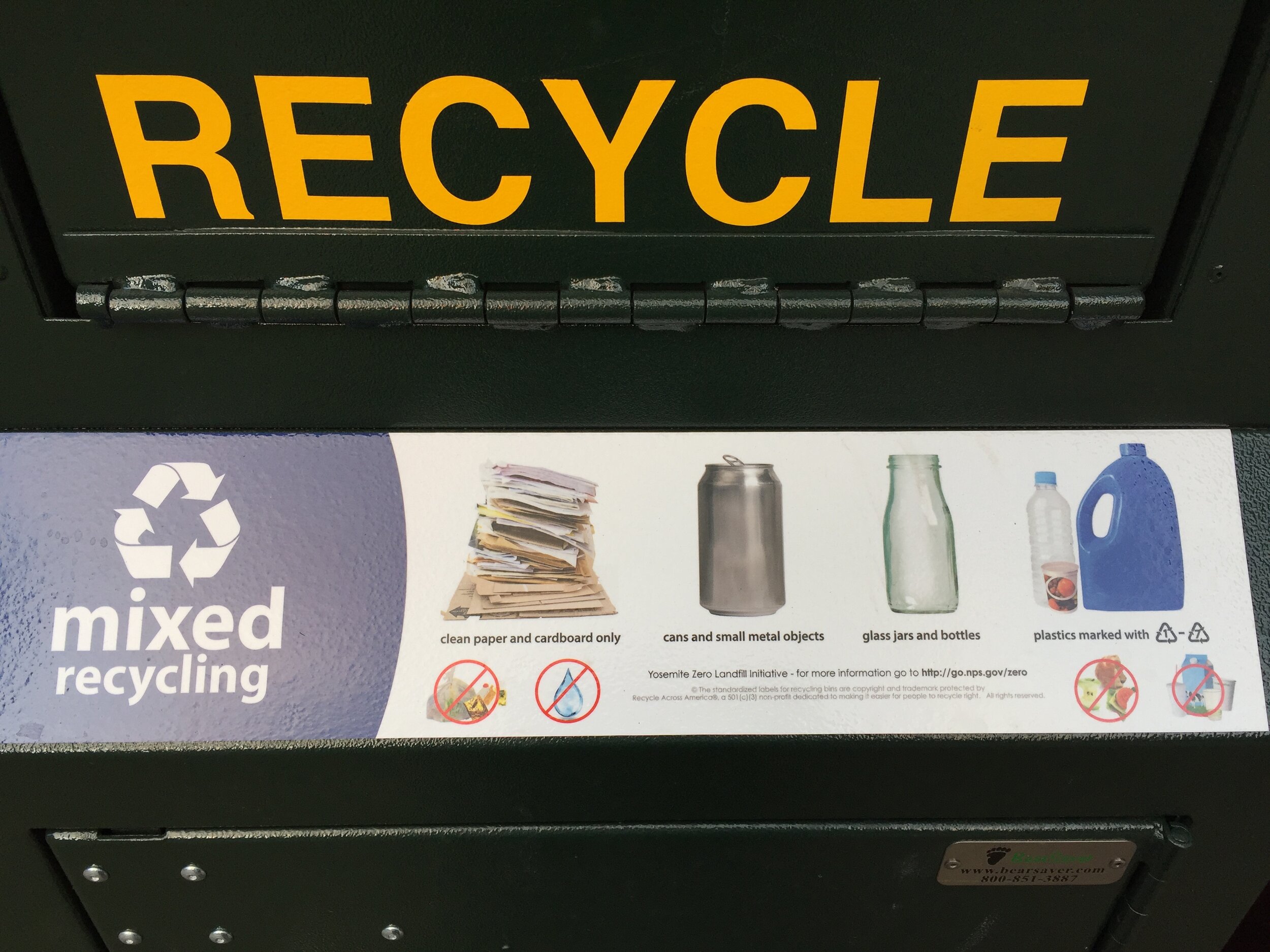
To aid employees in better sorting, the park in 2018 also shifted to different colored liner bags for recycling and waste collection.
To further improve the quality and quantity of recycling in the park, each container utilizes consistent Recycle Across America labels. In 2020, the Recycle Across America labels will also be installed on all Yosemite Hospitality containers.
An added benefit of the expanded and improved containers and labeling was a marked reduction in wildlife interactions especially with bears with visitor waste.
It’s a Wrap on Plastic Waste for Yosemite
Yosemite Hospitality is leading on the effort and would ideally like to address reduction by working with suppliers, but until they get more traction on this, they partnered with Trex who was excited to get the park’s plastic film. Ironically even in California with very mature recycling programs, a market for plastic film (e.g., plastic bags, overwrap and other flexible packaging) was unavailable. Through support from NPCA and in researching and reaching out to countless recycling programs and companies, they finally discovered Trex’s Recycle Beyond the Bag program. Trex will be receiving their plastic film upon completion of 35-40 bales, weighing 1000 pounds each.
Finding and maintaining space to stockpile the film prior to shipping has been difficult, but they identified an additional 43-foot trailer for the baled film. Acknowledging the amount of time and storage challenges prior to shipment, Yosemite Hospitality is in discussions with Mariposa County and Recology to expand the program to the community and other area businesses to accelerate the program.
No Butts About it…There are some hard to recycle materials out there
Yosemite Hospitality led in their park partnership with Terracycle to address several hard to recycle items. In 2019, the collected and recycled the following:
Disposable gloves – 922 lbs.
Snack wrappers – 187 lbs.
Cigarette butts – 115,560 pieces
They also partnered with Crayola in the Colorcycle program to recycle markers and Cycles 4 Hope to collect and donate abandoned bicycles in the park. Among other leading sustainability efforts, they also support an Aramark Green Thread commitment to ban plastic straws.
VISITOR EDUCATION
Pledging to Do More - Special Events Spur ZLI Awareness and Engagement
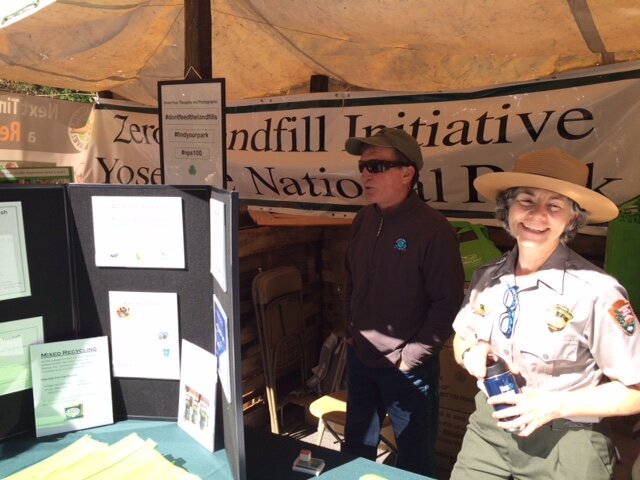
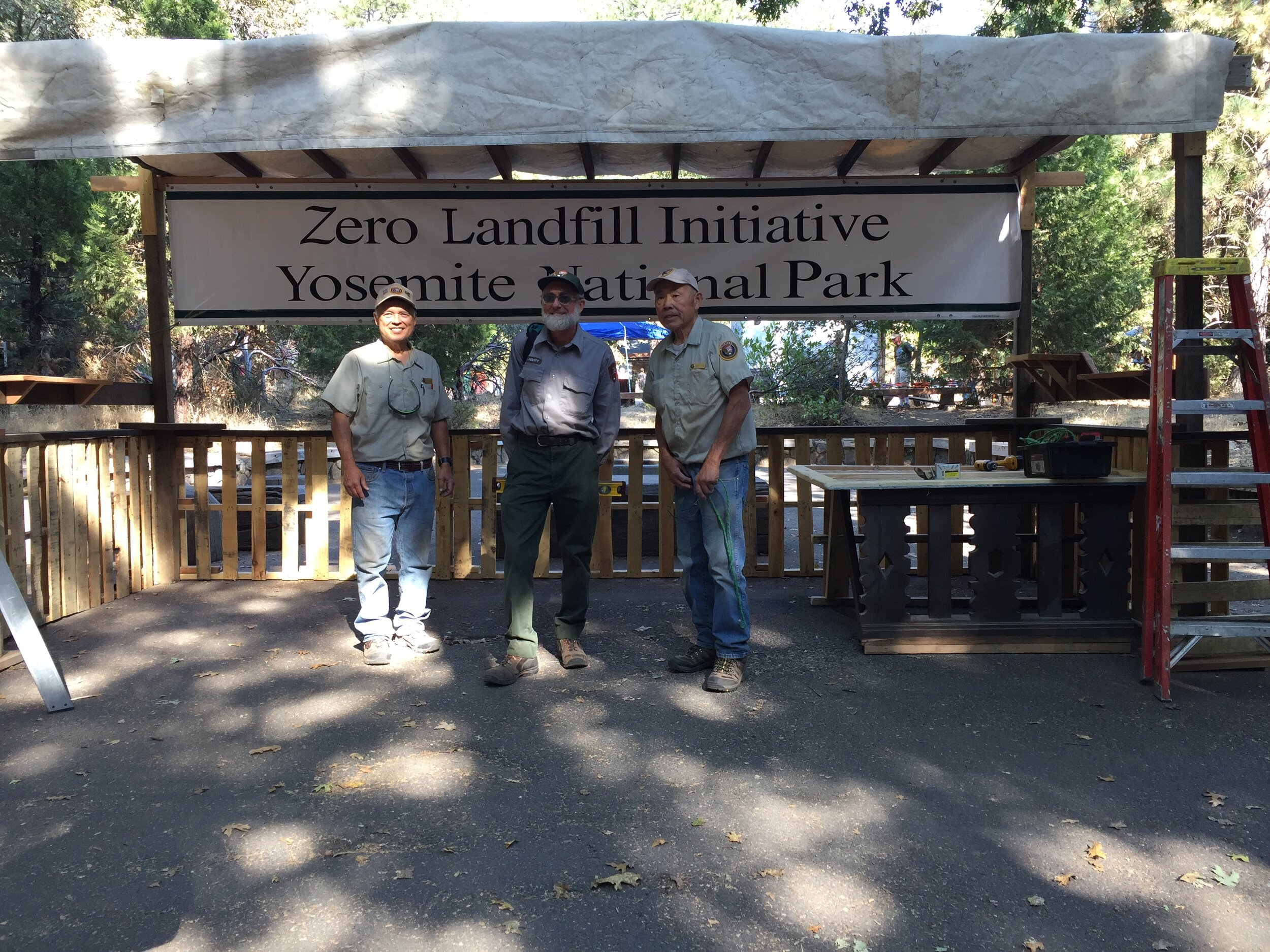
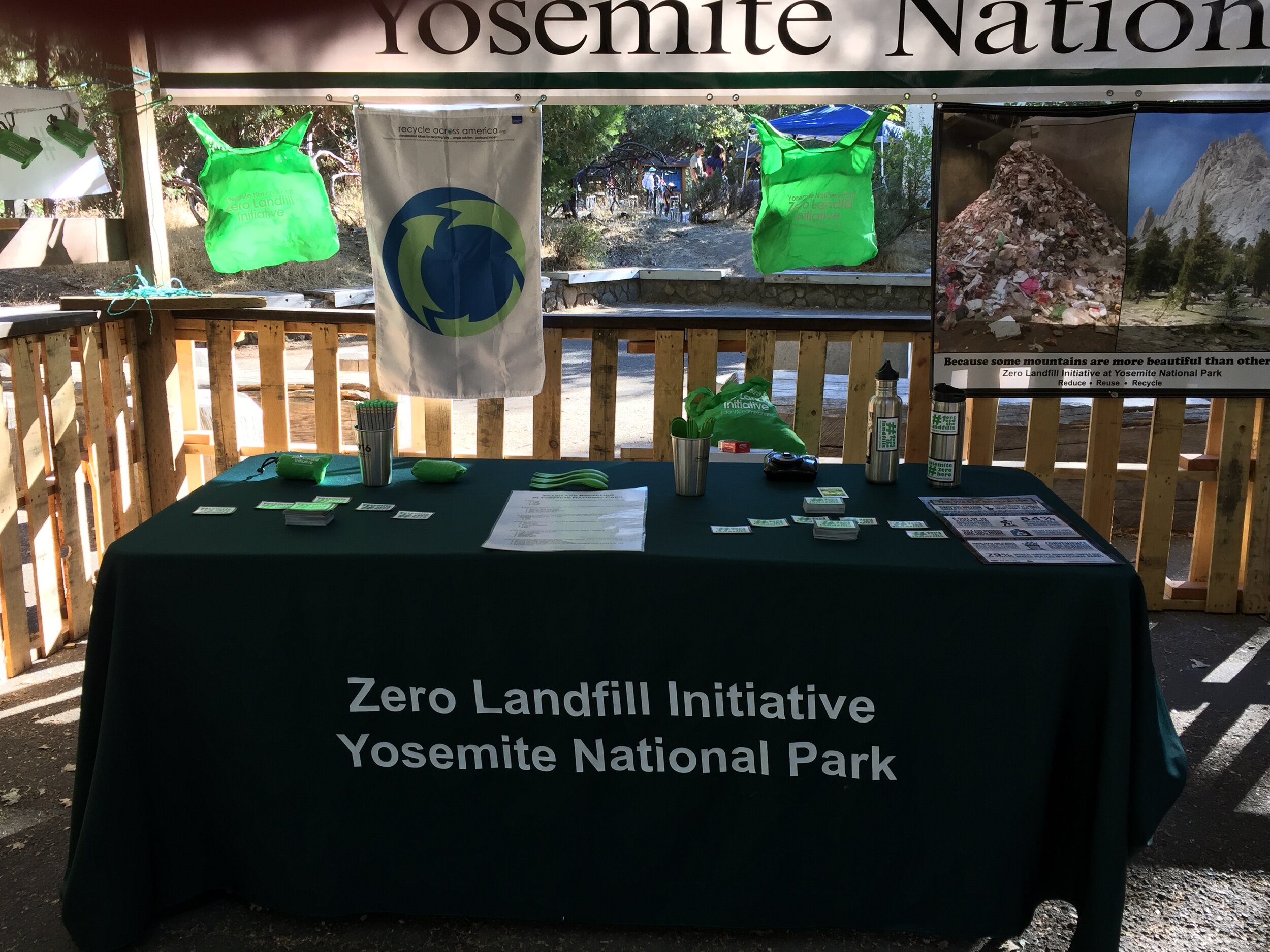
Modeling easy to replicate special events, highlights from Yosemite’s annual Earth Day events include informational displays, recycling sorting games for children; demonstrations on composting by the University of California Master Gardeners; and, propane cylinder swap by Kamps Propane. In 2018, the Yosemite Hospitality team collected over 5,000 pledges from visitors to carry refillable water bottles and shop with reusable bags.
For more than 15 years, the Yosemite Climbing Association has been organizing the annual Yosemite Facelift, an extensive cleanup of Yosemite set in late September. Both the NPS and Yosemite Hospitality, along with Subaru and NPCA are active partners. In 2019 alone, hundreds of volunteers collected 16,429 pounds of trash with at least half of which being “micro” trash.
In 2018, the NPS Zero Landfill Initiative program contributed to a reusable coffee container commemorating the 15th anniversary of Yosemite Facelift. The refillable Kleen Kanteen container nearly sold out and replaced a disposable paper cup traditionally provided with free coffee to encourage volunteers’ trash collecting efforts.
A Bridge to Yosemite and California Youth
Founded in 1971, Nature Bridge is the largest education partner of the National Park Service, with a significant presence in the region, the non-profit organization was brought in as a ZLI partner in 2019 to educate and engage youth from the region in reducing waste and expanding recycling and other diversion programs in their schools and communities.
In Yosemite, their early work has had significant impact reaching 25 schools and engaging 189 students in the Yosemite Gateway with classroom waste audits, landfill tours, litter pick-up and analysis, creation of educational posters and upcycled reusable totes and the expansion of Terracycle and recycling programs in their schools.
Nature Bridge ZLI leads partnered with Mariposa Middle School to initiate a Green Team that quickly engaged 12 students who focus on litter pick-up and analysis and study how waste impacts habitats and ocean health.
Future efforts will focus on empowering students to drive zero waste themed projects, increase local special events (e.g., Earth Day) and get more educators to the local landfill.
One park, Many Channels for Reaching Visitors
Every year, Yosemite National Park sends four million visitors’ trash to the landfill in Mariposa County, population 17,000. Compared to the county, the park’s waste generation has a huge environmental footprint. The park saw a need to educate its visitors.
Working with limited resources, initial outreach targeted staff and associates first. They were prioritized because they influence visitors. After that, with momentum building, outreach shifted to the visitors. (And with that now underway, the next target is the gateway business community!)
To reach as many visitors as many times as possible, the park worked with a professional facilitator to develop top messages about ZLI and how they fit with other critical park messages aimed at visitors. Then the park and its partners pushed out a consistent ZLI message across a variety of channels.
MEDIA: OLD & NEW
The park communicates with visitors through newspaper articles, radio and podcast interviews, videos and social media.
In old media, every edition of the park guide features an article on ZLI and guidance for visitors about how they can pitch in to recycle, compost and reduce waste headed for the landfill.
In new media, a ZLI intern worked on social media strategy. The ZLI team was a presence on local Facebook groups, always keeping in mind that there were two audiences – staff and visitors – and targeting each post accordingly.
When the ZLI video “Keeping Yosemite Green” was posted on Facebook, it received more than 45,000 views.
IN-PERSON: EVENTS & POP-UPS
Outreach events educate visitors with interactive displays, games, quizzes and eco-friendly giveaways branded with #dontfeedthelandfills. They range from small to large, like Earth Day.
For one Earth Day event, employees designed and built a booth out of materials that would normally end up in the landfill. That booth became a symbol of the park’s commitment to its ZLI principles.
Facelift is another annual gathering in Yosemite, a combination climbing event and clean-up-our-park effort. Visitors come from all over the country and the world to climb, see speakers and clean up.
The ZLI partners use outreach platforms like that to bring attention to the zero landfill issue, talk about the data they’re collecting and promote the new solutions they’re implementing. All the park partners, associates and staff come to these events. Many come because they want to learn about the ZLI. They leave with their eyes opened, saying, “I had no idea.”
In between events, pop-up interpretive programs focus on waste reduction, recycling and ZLI. All this ZLI education flows into every other aspect of the initiative, driving local cultural changes and inspiring participation. Whatever the project, Yosemite’s local residents continue to show up and affect change in their community.
ACTIONS SPEAK LOUDER THAN WORDS: CONCESSIONAIRE & COMMUNITY EFFORTS
Concessionaire Yosemite Hospitality, a subsidiary of Aramark, took over operation of the park’s concessions in spring 2016, just as the ZLI was gearing up. With 23 kitchens, 1,400 hotel rooms and 15 food and beverage venues, Yosemite Hospitality manages a lot of waste, compostables and recyclables.
One of Yosemite Hospitality’s first moves was to switch from plastic to compostable bags. That cut more than 186,000 plastic bags from the waste stream in just the first four months of operation. It was a publicly visible commitment to reducing plastic waste. Visitors got the message.
Yosemite Hospitality also sends clean, compostable organic waste to the Mariposa County Landfill and Recycling Center composting program. To keep the collected food waste free of plastics and other contaminants, the concessionaire continuously educates employees and visitors about proper organic waste disposal. As a result, it’s the only business that provides clean organic waste to the facility, which in turn makes the resulting compost available to local residents. They get the message, too.
Video Resources:
Keeping Yosemite Green: The Zero Landfill Initiative
Who We Are is What We Leave Behind: The National Parks Zero Landfill Initiative, Yosemite
EMPLOYEE EDUCATION
Yosemite Community Partners
Mariposa County Landfill & Recycling Center / Nature Bridge / Recology / Yosemite Climbing Association/Yosemite Facelift / Yosemite Conservancy / Yosemite Gateway Partners





